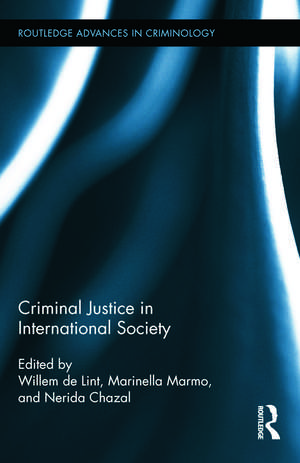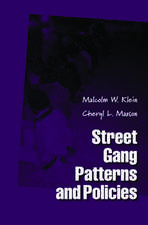Criminal Justice in International Society: Routledge Advances in Criminology
Editat de Willem De Lint, Marinella Marmo, Nerida Chazalen Limba Engleză Hardback – 13 ian 2014
Din seria Routledge Advances in Criminology
-
 Preț: 311.41 lei
Preț: 311.41 lei -
 Preț: 288.73 lei
Preț: 288.73 lei -
 Preț: 310.37 lei
Preț: 310.37 lei - 20%
 Preț: 278.00 lei
Preț: 278.00 lei -
 Preț: 440.00 lei
Preț: 440.00 lei -
 Preț: 348.00 lei
Preț: 348.00 lei -
 Preț: 445.22 lei
Preț: 445.22 lei -
 Preț: 430.43 lei
Preț: 430.43 lei -
 Preț: 387.99 lei
Preț: 387.99 lei -
 Preț: 369.73 lei
Preț: 369.73 lei -
 Preț: 383.89 lei
Preț: 383.89 lei - 18%
 Preț: 998.71 lei
Preț: 998.71 lei -
 Preț: 434.07 lei
Preț: 434.07 lei - 18%
 Preț: 1053.92 lei
Preț: 1053.92 lei -
 Preț: 433.86 lei
Preț: 433.86 lei -
 Preț: 422.59 lei
Preț: 422.59 lei -
 Preț: 388.13 lei
Preț: 388.13 lei -
 Preț: 385.08 lei
Preț: 385.08 lei -
 Preț: 436.14 lei
Preț: 436.14 lei -
 Preț: 369.73 lei
Preț: 369.73 lei - 18%
 Preț: 999.51 lei
Preț: 999.51 lei -
 Preț: 491.60 lei
Preț: 491.60 lei - 25%
 Preț: 766.49 lei
Preț: 766.49 lei -
 Preț: 433.05 lei
Preț: 433.05 lei - 18%
 Preț: 895.78 lei
Preț: 895.78 lei - 18%
 Preț: 729.55 lei
Preț: 729.55 lei - 18%
 Preț: 1054.71 lei
Preț: 1054.71 lei - 15%
 Preț: 463.82 lei
Preț: 463.82 lei -
 Preț: 415.67 lei
Preț: 415.67 lei
Preț: 1120.20 lei
Preț vechi: 1366.10 lei
-18% Nou
Puncte Express: 1680
Preț estimativ în valută:
214.35€ • 224.37$ • 178.41£
214.35€ • 224.37$ • 178.41£
Carte tipărită la comandă
Livrare economică 31 martie-14 aprilie
Preluare comenzi: 021 569.72.76
Specificații
ISBN-13: 9780415628303
ISBN-10: 041562830X
Pagini: 332
Ilustrații: 6
Dimensiuni: 152 x 229 x 23 mm
Greutate: 0.77 kg
Ediția:1
Editura: Taylor & Francis
Colecția Routledge
Seria Routledge Advances in Criminology
Locul publicării:Oxford, United Kingdom
ISBN-10: 041562830X
Pagini: 332
Ilustrații: 6
Dimensiuni: 152 x 229 x 23 mm
Greutate: 0.77 kg
Ediția:1
Editura: Taylor & Francis
Colecția Routledge
Seria Routledge Advances in Criminology
Locul publicării:Oxford, United Kingdom
Public țintă
Postgraduate and UndergraduateCuprins
Introduction: What Crime? Which Justice? What International Society? Willem de Lint Section I. International Crime and Criminology Foundations 1. The Rationale of International Criminal Justice: Idealpolitik, Realpolitik and the International Criminal Court Nerida Chazal 2. The Non-Existent Legal Basis for Judicial Interventionism John Laughland Section II. The Authority and Capacity of Actors in the International Criminal Justice System 3. Legitimising International Criminal Justice: The Importance of Process Control Nancy Combs 4. The Politics of Prosecution: The Role of the Prosecutor of the International Criminal Court Philip Stenning 5. Judicial Agency and Spatial Practices:A Geo-Political Analysis of New Configurations of Power Marinella Marmo Section III. The Aims and Objectives of International Criminal Justice 6. International Criminal Law Sentencing Objectives Grant Niemann 7. International Criminal Justice: Law, Courts, and Punishment as Deterrent Mechanisms? Dawn L. Rothe and Isabel Schoultz Section IV. International Criminal Justice at a National Level 8. Phosphorus and Stone: Operation Cast Lead, Israeli Military Courts and International Law as Denial-Maintenance Reem Bahdi 9.The International Criminal Court and the African Continent: Prosecution of International Crimes in National Courts Deslie Billich Section V. The Future of International Criminal Justice 10. The Rarefied Politics of Global Legal Struggles: Corporations, Hegemony and Human Rights Stefanie Khoury and David Whyte 11. Controlling Crimes of Globalisation: A Challenge for International Criminal Justice Dawn L. Rothe and David O. Friedrichs 12. Preventing International Crimes Alette Smeulers 13. Afterword: The Future of International Criminal Justice David Nelken
Notă biografică
Willem de Lint is Professor in the School of Law at Flinders University.
Marinella Marmo is Associate Professor in the School of Law at Flinders University.
Nerida Chazal is a Research Fellow in Criminology at Flinders University.
Marinella Marmo is Associate Professor in the School of Law at Flinders University.
Nerida Chazal is a Research Fellow in Criminology at Flinders University.
Descriere
This book adopts a critical criminological approach to analyze the production, representation and role of crime in the emerging international order. It analyzes the role of power and its influence on the dynamics of criminalization at an international level, facilitating an examination of the geopolitics of international criminal justice. Such an approach to crime is well-developed in domestic criminology; however, this critical approach is yet to be used to explore the relationship between power, crime and justice in an international setting. This book brings together contrasting opinions on how courts, prosecutors, judges, NGOs, and other bodies act to reflexively produce the social reality of international justice. In doing this, it bridges the gaps between the fields of sociology, criminology, international relations, political science, and international law to explore the problems and prospects of international criminal justice and illustrate the role of crime and criminalization in a complex, evolving, and contested international society.













